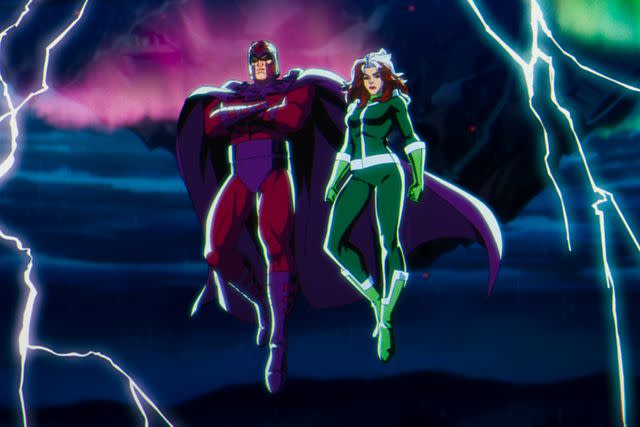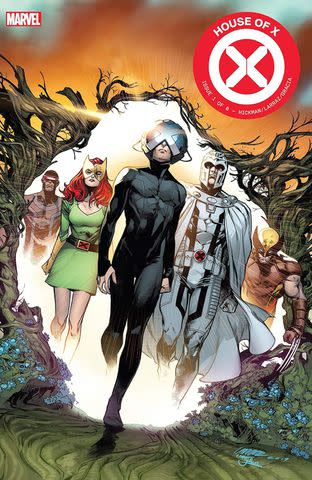The X-Men are the future of the MCU, so why are they burning through so much plot?
"X-Men '97" is a great reminder of why Marvel's mutants matter, but the frantic pace is worrying.
It’s been a long time coming, but the X-Men are once again the most important characters for the present and future of Marvel. During the pre-pandemic years when the Marvel Cinematic Universe dominated the box office and pop culture writ large, it became hard to remember the not-so-distant era when very few superhero fans cared about Iron Man or Captain America because they were too busy obsessing over the X-Men. Now that Robert Downey Jr.’s Iron Man is dead and Chris Evans’ Captain America has been replaced, that time has come again.
Related: How X-Men '97 embraces the legacy of the original series
X-Men ‘97, which just wrapped its first season, is the first official project about the iconic team of mutant superheroes to be produced by Disney since they bought Fox (and the film rights along with it) back in 2019. Not coincidentally, it’s also probably the first Disney+ Marvel series you’ve heard about from normal people in your life since season 1 of Loki, if not WandaVision. After all, the X-Men are exciting! They’re colorful and powerful, they have detestable villains and fascinating frenemies, and their central themes of “found family” and societal outcasts finding strength in solidarity still feel as relevant and empowering as ever. These 10 episodes have succeeded wildly at reminding viewers why the X-Men are fun to watch — the perfect prep for this summer’s Deadpool & Wolverine, which will be the first live-action MCU project to feature them.
So given all this exciting potential, why is Marvel burning through its X-Men material so rapidly?

Courtesy of Marvel Animation
Sign up for Entertainment Weekly's free daily newsletter to get breaking TV news, exclusive first looks, recaps, reviews, interviews with your favorite stars, and more.
For all its accomplishments, X-Men ‘97 also commits to an absolutely frenzied pace. Its predecessor, X-Men: The Animated Series, was known to turn to the comic-book source material for inspiration; the iconic “Dark Phoenix Saga,” for instance, was adapted into multiple episodes. By comparison, X-Men ‘97 has hardly let an episode go by without drawing from a specific comic — and rather than letting them breathe, has squeezed complex stories into a limited runtime.
This pace is especially notable because many of the new X-Men ‘97 episodes have been based on the work of Chris Claremont, who wrote Uncanny X-Men and other adjacent comics from 1975-1991 and in that time co-created many of the characters and concepts that fans are familiar with today. Precisely because he was in charge of the X-Men for so long, Claremont took his time with stories, letting characters deepen and narratives build over months and years. This is a major reason, frankly, that the world of the X-Men feels so deep and lived-in, even compared to other long-running superhero franchises.
Related: How X-Men '97 embraced the 'Magneto Was Right' slogan-turned-meme
Thanks to his extended tenure, Claremont’s X-Men comics still held plenty of storylines that weren’t used for the original animated series — enough to fuel a whole season or more of X-Men ‘97. But that’s not what the show did. To name one example, creator Beau deMayo (who was dismissed by Disney before the premiere, for still-unclear reasons) and his team stuffed Claremont’s epic event storyline Inferno into a single episode. They also mixed and matched elements from later comics, transplanting the Genosha genocide from Grant Morrison’s 2000s-era New X-Men into the middle of the season (and, as is the blessing and curse of the X-Men, creating some painful real-life parallels in the process) and invoking the “Magneto Was Right” slogan without exploring the cultural critique Morrison intended with it.
There’s nothing inherently wrong with rearranging source material; making cuts and drawing connections is just a natural part of the adaptation process, as Dune director Denis Villeneuve would tell you. But you can feel X-Men ‘97 straining from the effort to fit decades of comics into 10 episodes; every time the characters try to recap what happened just in the aforementioned Inferno episode — There’s a clone of Jean Grey named Madelyne Pryor! Who has the same powers but calls herself the Goblin Queen sometimes! And was created/manipulated by Mister Sinister? And then gave birth to Cyclops’ baby son, who had to be sent into the future, and became Cable! — they sound unhinged. If the plan is to produce multiple seasons of X-Men ‘97, the writers may regret burning so much plot fuel this early.
Another weird element of this frenzied pace is the impact it’s having on current X-Men comics. This sense of renewed importance for Marvel’s mutants has just come to MCU viewers with X-Men ‘97, but comic readers have been enjoying it for years now. Before the MCU was able to take advantage of the Disney/Fox merger, Marvel comics was on it immediately by bringing in acclaimed writer Jonathan Hickman to reimagine X-Men comics. The result was 2019’s House of X/Powers of X, an event miniseries that saw Professor X and Magneto team up to create a mutant nation-state called Krakoa. This fresh idea fueled years of interesting comics, even during the industry-wide shocks of the COVID-19 pandemic, but is currently coming to an unceremonious end.

Marvel
Nothing gold can stay in corporate superhero comics, the nature of the business is that everything has to be reverted to status quo every couple years, but the pace here is notably frenetic. The end of the Krakoa story is being told in multiple comics simultaneously (rather than the clean, clear storytelling of Hickman’s original miniseries), creating a lot of reader confusion in the race to wrap everything up so that the company can launch new X-Men comics with new #1 issues in time to capitalize on Deadpool and Wolverine this summer. Degrading the quality of these comics in this way seems ill-advised, when future MCU movies (or future seasons of X-Men ‘97, for that matter) might well be turning to Krakoa for inspiration and adaptation before you know it.
Related: Long Live the House of X: Marvel's X-Men creators discuss the Krakoa era
The emphasis on short-term pop is detrimental to the franchise’s long-term sustainability. It’s also pretty overwhelming to try to keep track of as a fan. The sense one gets is of sheer desperation from corporate Marvel, who really do need a brand course-correct after recent box-office failures and at least one ugly real-life scandal. But come on, what’s the rush everybody? It’s not like Marvel, or Disney, or the X-Men, are going away anytime soon. Can’t we all just take a breath?
Read the original article on Entertainment Weekly.


